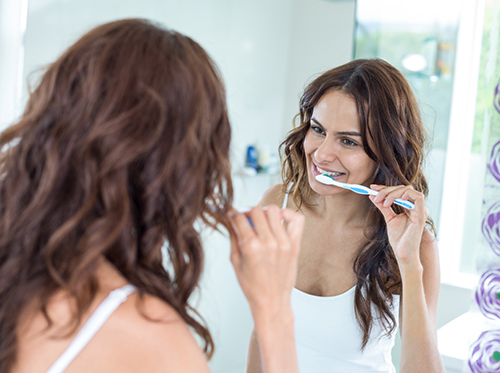Need Another Reason to Stop Biting Your Nails?
June 25th, 2025

Painful nails and cuticles, ruined manicures, reluctance to shake hands—there are so many good reasons to overcome the nail biting habit. But did you know that biting your nails is also bad for your dental health? Let’s look at a few more reasons to give our nails a break.
- Bacteria Bonanza
It’s a vicious—and unhealthy—circle. Nail biting leads to injuries to the nails, cuticles, and skin surrounding the nails. These broken, jagged nails can now cause injury to delicate gum tissue. And to make things worse, fingernails harbor a lot of germs and bacteria, leading to the risk of illness and oral infections. At the same time, bacteria from our mouths can get into the area around the injured nail, potentially leading to painful infections in the fingers.
- Bruxism
Studies have indicated that nail biters have a greater risk of bruxism. Bruxism, better known as tooth grinding, can lead to a number of serious problems over time. Grinding and even clenching teeth on a regular basis can cause chronic headaches, worn enamel, fractured teeth, broken dental restorations, receding and inflamed gums, and loose teeth.
- Breakage & Bad Bites
Your nails suffer obvious breakage, clearly, but your teeth are also at risk. The constant pressure of nail biting can lead to cracking, chipping, and erosion in the front teeth. Further, the pressure put on your teeth can even move them out of alignment, leading to bite problems. As you can imagine, nail biting has an even greater impact if you are wearing braces, because those teeth are already under pressure.
Why do we bite? Nail biting, or onychophagia, is a habit often started in childhood. Some people quit on their own as they reach adulthood, but for others, it can be a lifelong and painful habit. The explanations for nail biting are many: some researchers regard the habit as a form of compulsive behavior, others believe it to be a grooming impulse gone haywire, still others think it’s a way that we respond to anxiety or other stresses.
Whatever the cause, if you want to break the habit, you have options. There are over the counter polishes that use an unpleasant taste to deter biting. Learning to recognize triggers such as stress or boredom can help you choose a different response, such as snapping a rubber band around your wrist or gripping a stress ball. Dr. Dale Feichtinger, Dr. Steven McArtor, Dr. Chad Brown, and Dr. Paige Allison can recommend some techniques for modifying this behavior. And finally, we can offer you suggestions for quitting, or even customize a mouthguard at our Loveland office to discourage nail biting and prevent the problems that come with bruxism.
It’s never too late to quit. If nail biting has become more than a cosmetic problem, let’s work on a solution. Healthy, attractive nails are a great goal to work toward, but nothing beats a beautiful, healthy smile!





































































